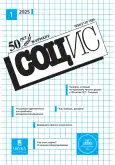“Society of trauma” as a conceptualization of uncertainty
- 作者: Kasavina N.A.1
-
隶属关系:
- Institute of Philosophy of the RAS
- 期: 编号 1 (2025)
- 页面: 10-20
- 栏目: Zh.T. TOSHCHENKO NINTIETH ANNIVERSARY
- URL: https://journals.eco-vector.com/0132-1625/article/view/685935
- DOI: https://doi.org/10.31857/S0132162525010014
- ID: 685935
如何引用文章
详细
The article explores the society of trauma concept by Zh. T. Toshchenko with reference to specific sociological and psychological research of recent years. The proposed reflections immerse it in the context of socio-philosophical and existential-literary discourse showing the historical importance of studying trauma in social sciences and humanities, as well as for understanding modern social processes. Scientific discourse integrates cultural forms of understanding traumatic events. It works in an interdisciplinary field, predicts risks and negative consequences of social development, and develops ways to overcome them. Thus, it manifests and implements critical and heuristic functions of scientific knowledge. The civilizational meaning of the phenomenon of the society of trauma is emphasized. It addresses the understanding of cultural gaps, radical changes in the activities of social institutions, sharp fluctuations of the lifeworld. Traumatization as a social phenomenon is associated with violations of the continuity in socio-cultural development, its purposefulness and controllability. It generates a long-term negative trace in relation to the socio-psychological well-being of the population. It also causes experienced instability, uncertainty of existence, and a crisis of wellness. In this regard, the article compares the data of different studies to exhibit the features and dynamics of the subjective response to trauma.The analysis carried out in the context of the society of trauma concept indicates a pronounced ambivalence of the public consciousness in modern Russia with its orientation towards a search for stable foundations of a civilized identity. The existing contradictions draw attention to the importance of integrating various parts of public consciousness to avoid new rounds in collective traumatizations.
全文:
作者简介
Nadezhda Kasavina
Institute of Philosophy of the RAS
编辑信件的主要联系方式.
Email: kasavina.na@yandex.ru
Dr. Sci. (Philos.), Corresponding Member of RAS, Professor of RAS, Chief Researcher
俄罗斯联邦, Moscow参考
- Abramov R. N. (2023) reviewed by Strebkov O. D., Shevchuk A. V. What do we know about freelancers? Sociology of free employment. Moscow: HSE, 2022. Rec. R. N. Abramov. Sotsiologicheskie issledovaniya [Sociological Studies]. No. 2: 165–168. (In Russ.)
- Anisimov R. I. (2024) Dynamics of employment in Russia (2018 – mid-2023). Sotsiologicheskie issledovaniya [Sociological Studies]. No. 1: 73–84. (In Russ.)
- Astashova N. D. (2022) Scientific precariat: Individualism versus Collectivism. Epistemologiya i filosofiya nauki [Epistemology and Philosophy of Science]. Vol. 59. No. 3: 30–37. (In Russ.)
- Information and analytical report “What we know about the society in which we live”, Moscow, 2023. URL: https://www.isras.ru/files/File/grant/grant_report_2023.pdf (In Russ.)
- Karavai A. V. (2024) Successful employment in modern Russia: what is that? Sotsiologicheskie issledovaniya [Sociological Studies]. No. 5: 39–53. (In Russ.)
- Kasavin I. T. (2021) Science as a source of public good and new humanism. In: The mission of a scientist in the modern world: science as a vocation and profession. Scientific ed. and comp. by E. V. Vostrikova, I. T. Kasavin. Moscow: ROIFN (B-ka zhurn. “Epistemology and Philosophy of Science”): 5–16. (In Russ.)
- Kasavin I. T. (2022) Scientific creativity as a social phenomenon. Epistemologiya i filosofiya nauki [Epistemology and philosophy of science]. Vol. 59. No.3: 19–29. (In Russ.)
- Katerny I. V. (2023) The development of the theory of crisis in sociology: the evolution of ideas and modernity. Sotsiologicheskie issledovaniya [Sociological Studies]. No. 10: 14–26. (In Russ.)
- Kozyreva P. M., Nizamova A. E., Smirnov A. I. (2024) Dynamics of working hours in the post-Soviet period. Sotsiologicheskie issledovaniya [Sociological Studies]. No. 5: 27–38. (In Russ.)
- Kozyreva P. M., Smirnov A. I. (2022) The evolution of the social well-being of Russians in the post-Soviet period: from collapse to contrast stability (1994–2021). Sotsiologicheskie issledovaniya [Sociological Studies]. No. 12: 29–41. (In Russ.)
- Levashov V. K. (2024) Citizens of Russia on the hybrid socio-political reality in the country. Sotsiologicheskie issledovaniya [Sociological Studies]. No.4: 113–127. (In Russ.)
- Magun V. S. (2023) Evolution of the basic values of the Russian population, 2006–2021. Sotsiologicheskie issledovaniya [Sociological Studies]. No. 12: 44–58. (In Russ.)
- Nestik T. A., Selezneva A.V et al. (2021) The problem of the psychological state of society and political processes in modern Russia. Voprosy psihologii [Questions of Psychology]. Vol. 67. No. 5: 3–14. (In Russ.)
- Shibarshina S. V. (2022) About the possibilities and prospects of the scientific precariat. Epistemologiya i filosofiya nauki [Epistemology and philosophy of science]. Vol. 59. No. 3: 55–60. (In Russ.)
- Strebkov O. D., Shevchuk A. V. (2022) What do we know about freelancers? Sociology of free employment. Moscow: VSHE. (In Russ.)
- Toshchenko J. T. (2020) The society of trauma: between evolution and revolution. Moscow: The Ves’ mir. (In Russ.)
- Voronina N. N., Feigelman A. M. (2022) On the way to open science: the precariat as a subject of scientific creativity. Epistemologiya i filosofiya nauki [Epistemology and philosophy of science]. Vol. 59. No. 3: 46–54. (In Russ.)
- Yurevich A. V. (2019) The experience of empirical assessment of the psychological state of modern Russian society (analysis of statistical data). Psihologicheskij zhurnal [Psychological Journal]. Vol. 40. No. 5: 84–96 (In Russ.)
- Yurevich A. V., Ushakov D. V., Tsapenko I. P. (2009) Quantitative assessment of the macropsychological state of modern Russian society. Psihologicheskie issledovaniya [Psychological research: electron. scientific journal]. No. 2(4). URL: http://psystudy.ru (In Russ.)
- Zhuravlev A. L., Yurevich A. V. (2012) The macropsychological state of modern Russian society. Ekonomicheskaya nauka sovremennoj Rossii [The Economic Science of modern Russia]. No. 2 (57): 137–140. (In Russ.)
补充文件









